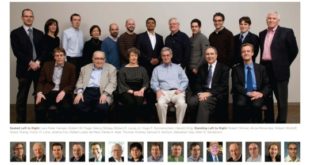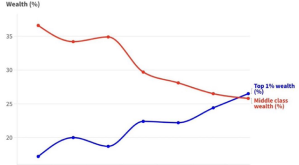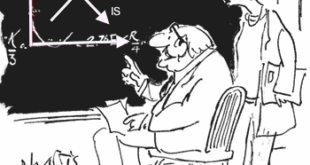real-world economics review Please click here to support this journal and the WEA Issue no. 108July 2024 download whole issue The creationist foundations of Herman Daly’s steady state economyJohn Gowdy and Lisi Krall2 Data: a critical perspectiveCarlos Guerrero de Lizardi16 Enlightenment Epistemology and the Climate CrisisAsad Zaman29 Fabulous MacroeconomicsGerald Holtham33 A Tour of the Jevons Paradox. How Energy Efficiency BackfiresBlair...
Read More »Capital and growth
from Lars Syll We’ve lots of evidence from different times and places that the elasticity of output with respect to capital is indeed small. In his famous paper which kickstarted this approach to thinking about economic growth, Robert Solow estimated (pdf) that only one-eighth of the increase in US GDP per worker between 1900 and 1949 was due to increases in the capital stock. The rest, he said, was due to technical progress. In Fully Grown, Dietrich Vollrath estimated that from 1950 to...
Read More »Why do domestic food prices keep going up when global prices fall?
from C. P. Chandrasekhar and Jayati Ghosh In the past three years, global food prices have been on a roller coaster, rising rapidly especially in the first half of 2022 due to a speculative bubble and then falling from July 2022 onwards (Figure 1). The phase of rising food prices led to increasing food prices around the world, especially in lower income countries—and this was obviously associated with growing hunger. According to the FAO, 122 million more people faced hunger in 2022...
Read More »AI, guaranteed income, and the “Which way is up?” problem afflicting our elites
from Dean Baker Leading media outlets like The New York Times, The Atlantic, and The New Yorker have about as much concern for intellectual consistency as TikTok videos. In very serious and somber tones they will warn the rest of us about a major problem and then in the next issue, or the next article, present a story that is 180 degrees at odds without ever realizing the contradiction. My favorite example of this “Which way is up?” problem is the simultaneous concern expressed that AI...
Read More »The teaching of economics — captured by a small and dangerous sect
from Lars Syll The fallacy of composition basically consists of the false belief that the whole is nothing but the sum of its parts. In society and in the economy this is arguably not the case. An adequate analysis of society and economy a fortiori can’t proceed by just adding up the acts and decisions of individuals. The whole is more than a sum of parts. This fact shows up when orthodox/mainstream/neoclassical economics tries to argue for the existence of The Law of Demand – when the...
Read More »Hudson on Super Imperialism 1
from Asad Zaman and WEA Pedagogy Blog In this sequence of posts, I will present the contents of the video podcast entitled “Michael Hudson: Why the US has a unique place in the history of imperialism? ” For me, Hudson’s book Super Imperialism: The Economic Strategy of the American Empire was an amazing eye-opener, essential reading for anyone who want to understand modern real world economics. The podcast provides a summary of his ideas, and these posts break it down further to make it...
Read More »U.S. Top 1% now have more wealth than the middle class
Deaton on labour shortages and wages
from Lars Syll ZEIT: Today, the debate focuses on the labor shortages facing many industrialized countries. Angus Deaton: I am always cautious when people talk about a scarcity of labor but don’t talk about wages. The argument always is: Americans don’t want to do these jobs, Germans don’t want to do these jobs. So we have to have migrants. But in many cases, it is not that Germans or Americans don’t want to do these jobs, but that they don’t want to do them at the wages we can pay...
Read More »On Janeway’s Mesoeconomics
from Peter Radford “Economics has become irrelevant.” PART ONE Oh my. Apparently Brad DeLong and I have the same problem. He, of course, is part of the elite club. I am decidedly not. So it is quite a shock to share something. What? He set out to write an 800 word review of Dan Davies’ new book and ended up about 5,000 words later still writing. I set out to write 1,000 words on William Janeway’s recent article on mesoeconomics, and here I am nearly 5,000 words later, still writing. ...
Read More »Weekend read: Theory and reality in economics
from Lars Syll So, certainly, both non-theorists and some theorists have little patience for research that displays mathematical ingenuity but has no value as social science. But defining this work exactly is impossible. This sort of work is like pornography quite simple to recognize when one sees it. Jeffrey Ely As researchers, we (mostly) want to try to understand and explain reality. How we do this differs between various disciplines and thought traditions. Creating a ‘map’ at a 1:1...
Read More » Real-World Economics Review
Real-World Economics Review





